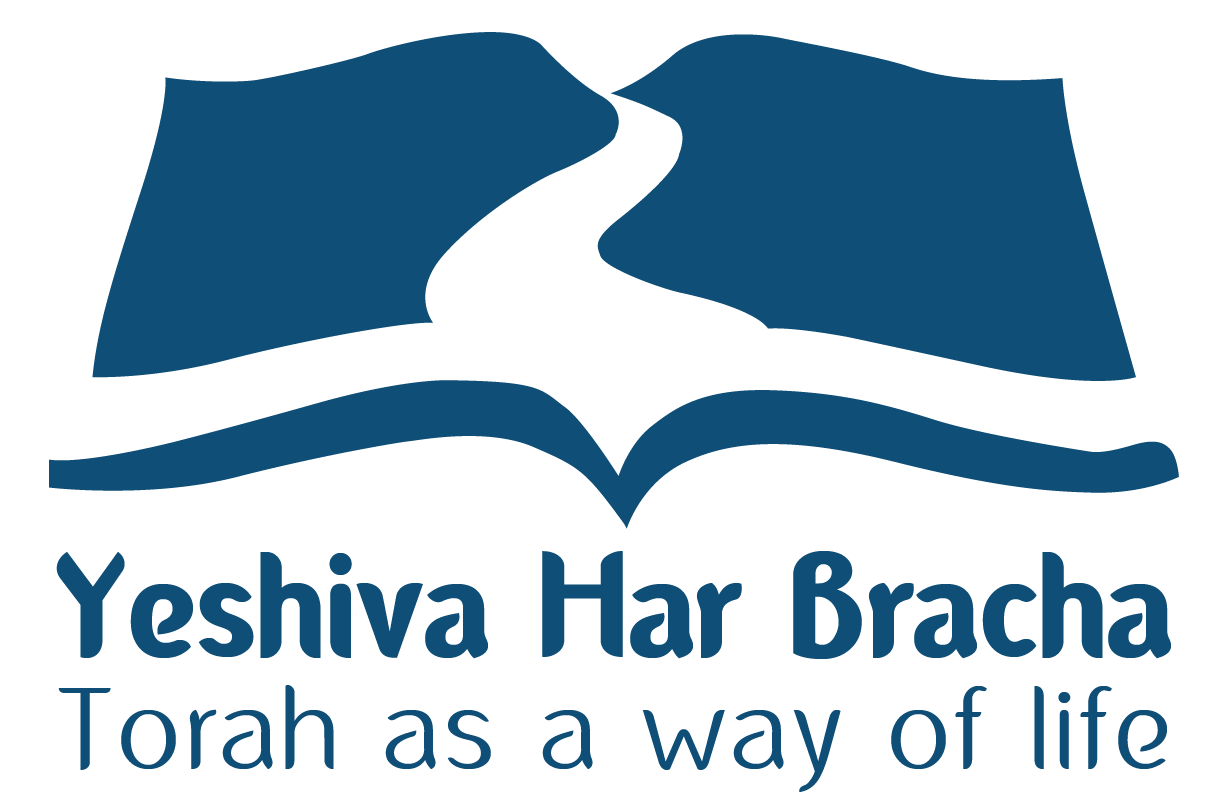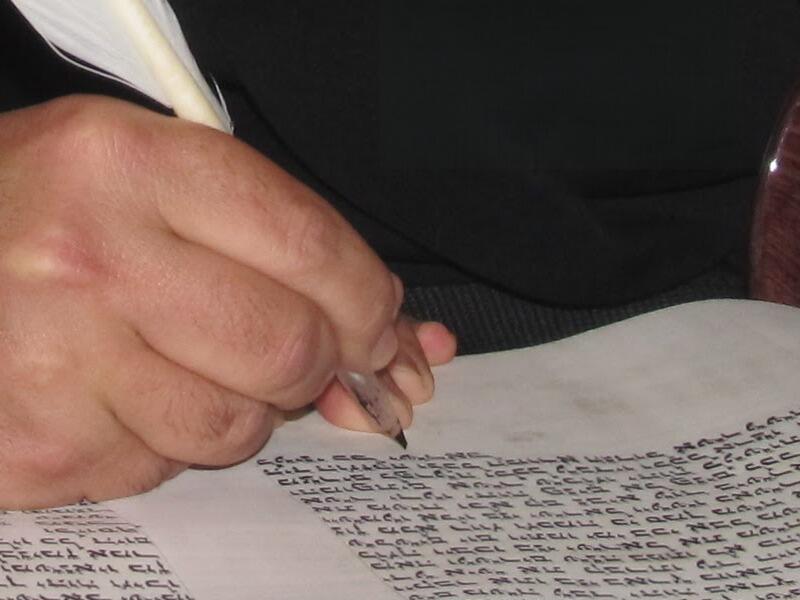The commandment upon every Jewish male is that he write for himself a Torah scroll * Fulfilling this commandment cannot be done using tithe money * Even one who inherited a Torah scroll from his fathers is commanded to write the Torah himself * Our Sages saw that in order to uphold the Torah among Israel it was necessary to permit writing down the Oral Torah * Today the practice is to fulfill the commandment of writing a Torah scroll in partnership * A woman too may study from the sacred Torah scroll
A Question About the Commandment of Writing a Torah Scroll
A question signed by a married couple: “Thank God, we find ourselves today in a good financial situation that allows us to invest for our future, as well as for our children. We are careful, as much as possible, to give a tithe of our money, and thank God, we see blessing in this. Now we find ourselves facing a dilemma regarding the commandment of writing a Torah scroll, whose cost is about 200,000 shekels. On the one hand, it is a commandment, and therefore, one may not use tithe money to fulfill a commandment. On the other hand, there are quite a few conditions and opinions in the matter, among them that a person must have enough available money to obligate himself to fulfill the commandment (it seems to me that in this, we meet the condition). The question: Does this commandment obligate today as in the past, when writing a Torah scroll was intended for the sake of Torah study? Does helping children with housing take precedence over this? They are not in a problematic financial situation, but perhaps helping them precedes the commandment of writing a Torah scroll?”
Another question: “In owning a Torah scroll, is there perhaps the appearance of pride, and a status symbol for people able to invest in such a thing? We also thought that perhaps we would purchase a small Torah scroll (a “travel edition”) and keep it at home with the willingness to serve as a free-loan fund for groups traveling on vacation in Israel or abroad. For placing another scroll in a synagogue’s ark does not seem to us like the fulfillment of the commandment itself.”
A: Fortunate are you that you merit discussing questions of a commandment. Indeed, as you wrote, the question is complex, and we will clarify it from its foundations. First, what is the commandment, and does it obligate today? But before all, I will preface, as you wrote, that fulfilling this commandment cannot be done using tithe money.
The Commandment of Writing a Torah Scroll
It is a commandment for every Jewish male to write for himself a Torah scroll, as it is said:
“And now, write for yourselves this song, and teach it to the Children of Israel; put it in their mouth, so that this song shall be for Me a witness against the Children of Israel” (Deuteronomy 31:19).
Many Torah scholars interpret that the “song” we were commanded to write is the ‘Song of Ha’azinu’, stated further on in the Torah. But since it is forbidden to write excerpts of the Torah, in order to write the ‘Song of Ha’azinu’, one must write the entire Torah (Rambam, Laws of Torah Scroll 7:1; Sefer Mitzvot Gadol, Rosh, Meiri, Beit Yosef, and more). And why was the commandment stated in this way? To teach us that the ‘Song of Ha’azinu’ expresses the entire Torah, the covenant God made with Israel, whose meaning is that the word of God is revealed to the world through the people of Israel, such that the history of Israel is the history of the revelation of God’s word in the world.
Indeed, the entire Torah is also called a “song,” because besides the things written in it plainly, there are hidden within it, great and immeasurably deep ideas. Thus, one can also explain that the commandment to write the song refers to the whole Torah, which is called a “song” (see the teachings of Rabbi Tzvi Yehuda, Talmud Torah, p. 294). Even one who inherited a Torah scroll from his fathers is commanded to write the Torah himself (Sanhedrin 21b), because through writing the Torah for himself, he merits to connect personally to the Torah, and through contemplating the Torah scroll that he wrote, he will be further strengthened in fulfilling the commandments written in it.
The Permission to Write the Oral Torah
Nevertheless, we must remember that originally it was permitted to write only the Written Torah, that is, the books of the Tanakh. And God commanded that every Jewish male write for himself the Torah in ink on parchment according to the laws of writing sacred texts, and the learned wrote also the Prophets and Writings, and in these books, they studied all the days of their lives. And writing down the Oral Torah was forbidden, in order that it remain alive in the hearts, and preserved in memory. But after the generations diminished, and the matters of the Oral Torah expanded and multiplied with many opinions, and the nation began to disperse into various exiles, the Sages of Israel saw that in order to maintain the Torah among Israel, it was necessary to permit writing down the Oral Torah. Thus, the Mishnah was written, and after it, the Jerusalem Talmud, the Babylonian Talmud, the Midrashim, commentaries, and halakhic rulings—until most study was conducted in books of the Oral Torah. Since they permitted writing the Oral Torah, they permitted also writing the Tanakh in simple script, not on parchment—initially by hand, and later in print.
The Dispute Among the Early Authorities
Because even the study of the Written Torah is conducted in books that are not a Torah scroll written in ink on parchment, and most study takes place in books of the Oral Torah, the question arose whether there remains a commandment to write a Torah scroll, when in practice, people do not usually study from it.
According to Rambam (Laws of Torah Scroll 7:1), even after study began to take place from other books, the commandment remained in force. That is, the essence of the commandment is to connect to the Torah as it was given at Sinai, and as our Sages said (Menachot 30a), that anyone who writes a Torah scroll “Scripture considers it as if he received it from Mount Sinai.”
According to the Rosh (Laws of Torah Scroll 1), the commandment to write a Torah scroll is so that Jews can study the Torah and fulfill its commandments. When all study was conducted in the sacred Torah scroll, naturally the scroll would wear out within one to three generations. And since the Torah commanded each person who is able to write a Torah scroll, all Jews had the possibility to study Torah. One who could write would merit to study from the scroll he wrote, and others studied from scrolls remaining from previous generations. But from the time writing the Oral Torah was permitted, the commandment is fulfilled by purchasing the books from which Torah is actually studied, and there is no commandment for a person to write a Torah scroll (Derisha YD 274:4; Shach 5).
Practical Halakha According to Both Opinions
In practice, the halakha follows both approaches, as ruled in the Shulchan Aruch (Yoreh De’ah 274:1–2). In section 1, it is ruled that it is a commandment for each person to write a Torah scroll according to its transmission from Sinai, and even one who hires a scribe to write for him fulfills the commandment. And in section 2, it is ruled that it is a commandment for every Jew to purchase for himself the foundational Torah books so he can study from them.
The Custom Today: Fulfilling the Commandment in Partnership
Today the common practice is to fulfill the commandment of writing a Torah scroll in partnership, in such a way that many people take part in funding the writing of the Torah scroll. After its completion, they dedicate it to the synagogue for Torah reading, with the stipulation that the scroll remain theirs, and thus they continue to fulfill the commandment with it, all their lives. Although there is a dispute about whether the commandment can be fulfilled in partnership—some poskim say it cannot be fulfilled in partnership (Beit Yehudah YD 23; Pele Yoetz “Sefer”; Ruach Chaim [Palagi] 274:6; Aruch HaShulchan 11). And some say it can be fulfilled in partnership (see Pitchei Teshuvah 274:1; Da’at Kedoshim 274:1; Shoel U-Meishiv I:266; Nefesh Chaya YD 75; Igrot Moshe YD I:163).
But since some hold that today there is no commandment at all to write a Torah scroll (Rosh, Derisha, Shach), one may rely on the authorities who allow fulfilling the commandment in partnership. And this is preferable, for otherwise the sacred scrolls would multiply, and since most would not be used, there is concern that they may be degraded for lack of a respectful place to keep them. Additionally, since this is a very expensive commandment, one who cannot afford it is not obligated (Rosh, Laws of Torah Scroll §1); and in Igrot Moshe (YD I:163), it is calculated that a person should not spend more than a tenth of his available money on this commandment.
A Wealthy Person Who Wishes to Fund the Writing of a Torah Scroll
Therefore, a wealthy person who can easily fund the writing of a Torah scroll, and knows of a synagogue that lacks a Torah scroll, has grounds to fulfill the commandment according to all opinions and fulfill it without partnership, and fund the writing of a Torah scroll for that synagogue. Likewise, a wealthy person who wants to have a Torah scroll in his home, in order to honor it and to read from it occasionally the weekly portion twice (shnayim mikra), has grounds to beautify the commandment according to all opinions, and hire a scribe to write a Torah scroll for him.
Answer – Guidance
Since you are able to fulfill the commandment without partnership, and you intend to designate for the Torah scroll a respectful place in your home, and to study from it from time to time the weekly portion, and in addition, to lend it for communal needs of Torah reading, you have the commandment to write it. And you need not fear pride. On the contrary, out of humility that everything is by the grace of God, it is fitting for a person to take pride in the commandments he fulfills.
Since you ask as a couple, I will add that although a woman is not obligated to write a Torah scroll, a woman who funds the writing of a Torah scroll fulfills a mitzvah. And since you are a couple, you are considered a single unit, and you both fulfill the commandment together.
Regarding the question of what is preferable—helping children with their welfare needs, or writing a Torah scroll—this is your personal decision. For as I explained, the commandment can be fulfilled in partnership, and thus, as with many decisions—such as whether it is better to expand the home, or take a vacation, or donate to a mitzvah cause—this is a personal decision. For after you give a tithe of your money, and sometimes even a fifth, you are not obligated to add more giving.
Is It Preferable for a Person to Study from the Sacred Torah Scroll in His Home?
I will add that although some poskim hold that after printing Chumashim was permitted, it is preferable to study from printed books, and not to treat the sacred Torah scroll lightly by opening it for regular study. Moreover, the Torah scroll has no vowel points, and studying from it is more difficult (Perishah YD 274:8; Shach 5). However, on the other hand, it is implied from all who hold that every person is commanded to write for himself a Torah scroll, that there is a virtue in studying from the sacred Torah scroll. And it seems that from Torah scrolls dedicated to a synagogue, it is not proper for a private individual to study. But one who has a Torah scroll in his home—there is an advantage in studying from the scroll that belongs to him.
A woman too may study from the sacred Torah scroll, for there is no prohibition for women, even during their menstrual period, to touch the Torah scroll or to kiss it (Shulchan Aruch YD 282:9). Indeed, men and women alike, out of respect for the Torah scroll, must be careful not to touch the parchment with bare hands, but to roll it only using the wooden rollers. And if it is necessary to adjust the parchment, one wraps the hand with a cloth for that purpose (Shulchan Aruch Orach Chaim 147:1).
This article appears in the ‘Besheva’ newspaper and was translated from Hebrew.








